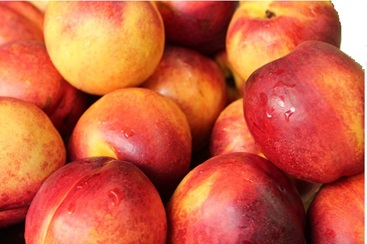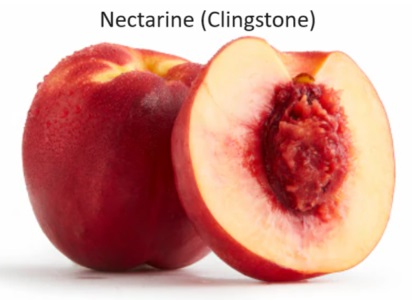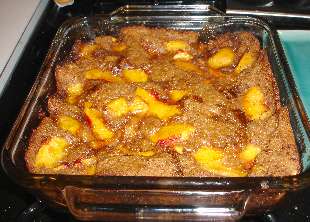
Nectarine U-Pick Orchards in Berks County, Pennsylvania in 2026, by county
Below are the U-Pick orchards and farms for nectarines that we know of in this area.
Not all areas of a state have nectarines orchards that are open to the public. If you know of any others, please tell us using the add a farm form!
Remember to always check with the farm's own website or Facebook page before you go - or call or email them if they don't have a website or Facebook page. Conditions at the farms and crops can change literally overnight, so if you want to avoid a wasted trip out there - check with the farm directly before you go! If I cannot reach them, I DON'T GO!
PLEASE report closed farms, broken links and incorrect info using the "Report Corrections" form below.
New! As inflation remains high, see this page for
reliable (tested) brands of generic canning lids at lower
costs, and cost-saving measures for
getting fruit and vegetables and home canning.
If you are having a hard time
finding canning lids, I've used these, and they're a great price & ship in 2 days.
New! Road tripping and camping is a great way to have a fun, safe and inexpensive family trip. The national and state parks and monuments are open, and campgrounds usually cost between $10 and $40 per night. September to November is the best camping weather. See our new website Road Tripping and Camping.com for tips, tricks, guides, checklists and info about parks, monuments and other places to visit.
New! We just went live with our latest website, FunFactoryTours.com - As they name implies, you can find a fun factory tour, including chocolate, automobiles, historical forts and sites, famous buildings, Active Federal facilities even fun geology: like fossils and volcanic areas
Berks County
- The Berry Farm and Orchard - apples, apricots, blueberries, cherries, loganberries, nectarines, other berries, pears, peaches, plums, raspberries (red), raspberries (Spring, red), raspberries (Autumn, red), raspberries (yellow), raspberries (black), raspberries (Spring, black), strawberries, Other fruit or veg, U-pick and already picked
86 Moselem Church Rd, Kutztown, PA 19530. Phone: (610) 597-8501. Email: staceymullen04@hotmail.com. Open: Late May to late October, see their website or Facebook page for hours and availability. Directions: Just North of the intersection of Rt. 222 & Rt. 662 in the Kutztown area. Click here for a map and directions. Payment: Cash, Check.
The Berry Farm and Orchard Facebook page. 222 & Rt. 662 in the Kutztown area. They have containers or you can bring your own. Tree fruit and more are also available on our Farm Stand. We have baby lettuces and herbs that are PYO too! Typical seasons (may VARY!)Strawberries - Late May to July. Early, mid, & late season varieties.Brambles -June & July. Raspberries - Red, black, purple, & yellow, elderberry, & blackberry.Blueberries -late June through July. Blue Crop and DukeCherries - late June, sweet for now. (Sours in 2 yrs.).Flowers - Sunflowers, Gladiolus, Zinnia's & more - June -AugSpecialty Salad Blends, Peppers, & Tomatoes - July - Aug 2022 season information: PYO strawberry pricing: $4.00 lb less than 10 lbs, $3.75 LB more than 10 lbs (ADDED: March 16, 2018) (UPDATED: May 18, 2025, JBS)
[ Click here to update the listing ] - Weaver's Orchard - Apples, apricots, blackberries, blueberries, cherries, kiwi berries, nectarines, peaches, pears, plums, pumpkins, raspberries, strawberries, U-pick and already picked, farm market
40 Fruit Lane, Morgantown, PA 19543. Phone: 610-856-7300. Email: info@weaversorchard.com. Open: Pick - your - own hours: Monday through Friday 10 am to 5 pm, Saturday 9 am to 5 pm Market hours remain Monday through Friday 8 am to 7 pm and Saturday 8 am to 5 pm. Directions: Located in Robeson Township, Berks County Pennsylvania. Click here for a map and directions. Payment: Cash, Check, Debit cards, Visa, MasterCard, Discover, AmEx, SFMNP Vouchers.
Weaver's Orchard Facebook page. Last admittance a half hour before close each day; Whenever the forecast is for temperatures to reach 90 or above our PYO hours will be 7 am to 2 pm on Monday to Friday. Strawberries Possibly opening May 31st, peak expected June 12th. Red & Black Raspberries Late June, Peak expected week of July 1st. Blueberries Late June, Peak expected around July 1st. Sweet & Sour Cherries; Sour cherries - Late June/early July; Sweet cherries - TBD. Address: 40 Fruit Lane, Morgantown, PA 19543 GPS option: 685 Weaver Road, Morgantown, PA 19543 Morgantown: North on Route 10, approximately 5 miles to Weaver Road turn right. (I-76) Exit 298: North on Route 10, 5 miles to Weaver Road on right. 422 Reading: South on I-176 to Exit 7 Green Hills. South on Route 10, 5 miles to Weaver Road turn left. . offers farm fresh fruit from May-November and also features a market open year round; The mark..
[ Click here to update the listing ]
Nectarine
Nectarine Picking Tips, Recipes and Information
Nectarines typically peak during early summer: In the U.S., that's late June through July in the South, and July and August in the North. In order to produce good local Nectarines, producers depend on ideal spring and early summer weather conditions, and no late frosts. If you want to know which are the best varieties of nectarines for home canning, see this page!
Before you leave to go to the farm:
- Always call before you go to the farm - Nectarines are affected by weather (both rain and cooler temperature) more than most crops. And when they are in season, a large turnout can pick a field clean before noon, so CALL first!
- Leave early. On weekends, then fields may be picked clean by NOON!
-
Most growers furnish picking containers designed for nectarines, but they may
charge you for them; be sure to call before you go to see if you need to
bring
containers.
If you use your own containers, remember that heaping Nectarines more than 14 inches deep will bruise the fruit on the bottom. Plastic dishpans, metal oven pans with 3 inch tall sides and large pots make good containers.
- Bring something to drink and a few snacks; you'd be surprised how you can work up a thirst and appetite! And don't forget hats and sunscreen for the sun. Bugs usually aren't a problem, but some deet might be good to bring along if it has been rainy.
- You might want to ask whether the nectarines are! There are two major types of nectarines: "Freestone" and. "Clingstone". Freestone nectarines and nectarines have flesh that slips easily away from the pit. Clingstones are a REAL pain, because the fruit tenaciously clings to the stone or pit! Most nectarine varieties grown today are freestone and are usually available (depending upon your location) from June through September. Some nectarines are freestone and some are clingstone. Freestone nectarines are available in June and July. Most plum varieties are clingstone.
When you get home
-
Spread the fruit out on towels or newspapers and separate any mushy or
damaged fruit to use immediately.

- Put a couple of days supply into the fridge, wash and cut the others and freeze them up!
- Even under ideal conditions nectarines will only keep for a week in a refrigerator, so for best flavor and texture, use them as soon as possible after purchase
- Now, get ready to make Nectarine jam or canned nectarines - It is VERY easy -
especially with our free peach / nectarine recipes. Yes, they are interchangeable!
- nectarine jam instructions - they're illustrated and easy and our page on
- how to make home canned nectarines from fresh!
- Or see here to freeze nectarines instead!
- make your own home canned nectarine pie filling to use in the winter - Here's a great and easy nectarine pie
recipe

or nectarine-blueberry pie or how about
- nectarine salsa?
- Nectarine chutney
- Spiced nectarines
- nectarine butter
- Nectarine honey
- pickled nectarines
- nectarine syrup
- nectarine juice - Here are some great and easy
nectarine desert recipes, like easy
nectarine cobbler.

- If you want more information about the Giant Peach water tower in Gaffney, SC, click here.
Temporary Storage Tips
- Ripe nectarines have a creamy or golden undertone and "peachy-sweet" fragrance.
- Nectarines should be refrigerated and used within a few days.
- Putting peaches and nectarines in a loosely closed paper bag at room temperature for a day or two can help soften firm fruit - but they won't become sweeter or ripen further - that stopped when they were removed from th etree.
- For best flavor, allow the fruit to ripen fully on the tree.
- Store at 33F to 40F and high humidity (a vegetable drawer in the fridge).

How to tell if the nectarines are ripe!
- Attached to the tree: Nectarines are best picked when the fruit separates easily from the twigs. If it is hard to pull off the tree, it isn't ripe! Nectarines will not ripen further once removed from the tree (they only "soften")
- Color: Green is definitely unripe, but you can't use red color as an indicator of how ripe a nectarine is. Different peach varieties have differing amounts of red blush in their natural coloring. Pick them when the ground color changes from green to yellow, orange, red (or a combination). The skin of yellow-fleshed varieties ripens to an orange tint, while the skin of white-fleshed varieties changes from greenish- to yellow-white.
- Softness: unless you like your nectarines very firm, pick your nectarines with just a little "give" when gently pressed. Nectarines at this stage are great for eating, freezing, and baking. Nectarines won't ripen very much after picking!
- Odor: It should smell sweet and ripe!
Tips on How to Pick Nectarines
A nectarine is softer than most fruit, so it is important to pick a nectarine gently, with little pressure. Using the sides of your fingers rather your fingertips helps to avoid bruising. Grab the nectarine firmly and pull it straight off the branch. DON'T drop the nectarine into the basket, but set it in gently!
Marks on the Nectarines: Bugs (particularly squash bugs and stink bugs) bite fruit during development and this results in some imperfections in the nectarine. This is especially the case with organically raised fruit. These look like dents in the nectarines if the nectarines were bitten by a bug when they were young. This causes a spot that does not grow properly and makes a wrinkle in the nectarine. There's nothing wrong with these nectarines. They may look funny, but they will taste just as good as blemish-free nectarines, and it's better not to have the pesticides!

How much do you need?
Raw measures:
- About 2 medium nectarines = 1 cup sliced nectarines.
- About 4 medium nectarines = 1 cup pureed nectarine.
- About 3 medium nectarines = 1 pound of nectarines
Process yields (Raw amounts to processed amounts)
- 2 to 21/2 pounds of fresh nectarines yields 1 quart canned
- 1 lb of fresh nectarines typically yields 3 cups of peeled, sliced nectarines or 2 cups or puree.
- It takes about 5 good sizes peaches or nectarines (or about 10 plums) to fill one quart jar of canned nectarines.
- An average of 171/2 pounds of fresh nectarines are needed per canner load of 7 quarts;
- An average of 11 pounds is needed per canner load of 9 pints.
- 1 bushel = 48 to 50 pounds, yields approximately 18 to 25 quart jars.
And a visitor contributes this: 6-7 nectarines makes about 4 cups puree, so 2-3 nectarines make about 2 cups puree. 1 nectarine equals about 1 cup puree.
Nectarines - Average retail price per pound and per cup equivalent, Most recent data (2020)
| Form | Average retail price *3 | Preparation yield factor | Size of a cup equivalent | Unit | Average price per cup equivalent | |
| Fresh *1 | $1.72 | per pound | 0.96 | 0.342 | pounds | $0.61 |
| Canned | ||||||
| Packed in juice *2 | $2.02 | per pound | 1 | 0.540 | pounds | $1.09 |
| Packed in syrup or water *3 | $1.81 | per pound | 0.65 | 0.441 | pounds | $1.23 |
| Frozen | $3.39 | per pound | 1 | 0.331 | pounds | $1.12 |
| Note 1 - The USDA National Nutrient Database for Standard Reference (SR) reports that the inedible pit of a nectarine accounts for 4 percent of the retail weight, implying a preparation yield of 96 percent, when eaten raw. | ||||||
| Note 2 - Consumers are assumed to eat the solid fruit and drink the juice. All contents of the can are edible and count towards an individual's recommended fruit consumption. | ||||||
| Note 3 - The syrup (or water) is discarded prior to consumption. Based on the Food Patterns Equivalents Database (FPED), ERS assumes that 65 percent of the can's gross weight is solid and 35 percent is liquid. The FPED cup equivalent weight for canned fruit is the weight of the solids and not of the liquid medium in which it is packed. The preparation yield factor for canned nectarines in the above table does not account for any further preparation that occurs prior to consumption. | ||||||
| Source: USDA, Economic Research Service calculations from 2020 Circana (formerly Information Resources, Inc. [IRI]) OmniMarket Core Outlets (formerly InfoScan) data; the USDA National Nutrient Database for Standard Reference (SR), Legacy Release; and the Food Patterns Equivalents Database (FPED) 2017�18 as well as the FPED's accompanying Methodology and User Guide. | ||||||
---
Nectarine pit tips
It's best to remove nectarine pits before you cook the nectarines. Cherry, nectarine, peach, and apricot pits also contain amygdalin; the latter two, in potentially harmful amounts. Fortunately, nectarine, peach and apricot pits are sufficiently large and hard that few people intentionally swallow or chew them. (The unapproved anti-cancer drug See this page for more information&URL=http%3A%2F%2Fwww.cancer.gov/cancerinfo/pdq/cam/laetrile">Laetrile is a semisynthetic derivative of amygdalin; a cheaper version of laetrile produced in Mexico came from crushed apricot pits.) See this page for more information.
Other Local Farm Products (Honey, Horses, Milk, Meat, Eggs, Etc.)
(NOT pick-your-own, unless they are also listed above)
- Farm markets and roadside stands
- Local Honey Finder
- Local Meat, Milk and Eggs
- Venues: Farms, Wineries, Orchards for your event, wedding or party
- Easter egg hunts
- Children"s consignment sales
- Fruit and vegetable festivals
- Winery tours and wine tastings
- Horse rides, stables, lessons, trails
- Maple Syrup farms and sugarworks
- Bed & Breakfasts on Farms, Wineries, Ranches and Orchards
- Pumpkin patches
- Corn mazes
- Zombie Paintball venues
- Christmas Tree Farms & lots
- Environmental resources
- Consumer fraud information
- Wholesale food sources
- Resources for Farmers
Looking for canning equipment and supplies?
Water bath canner with a jar rack
Pressure canners for gas, electric and induction stoves: Presto 23Qt or T-fal 22Qt
Canning scoop (this one is PERFECT)
Ball Blue book (most recent version)
Jars: 8oz canning jars for jams
Want to start your own Podcast, Blog, Vlog, etc? This GoPro kit has EVERYTHING you need: GoPro Hero Black Compact - Waterproof Action Camera with 4K Ultra HD Video and all accessories
Find Other types of farms:
Farm markets and roadside stands
Road trips and camping resources
Local Honey, apiaries, beekeepers
Consumer fraud and scams information
Home canning supplies at the best prices on the internet!
Maple Syrup Farms, sugarworks, maple syrup festivals
Environmental information and resources
Farms For Your Event for birthday parties, weddings, receptions, business meetings, retreats, etc.
Festivals - local fruit and vegetable festivals
Get the
most recent version of
the Ball Blue Book
With this Presto 23 quart pressure canner and pressure cooker, you can "can" everything, fruits, vegetables, jams, jellies, salsa, applesauce, pickles, even meats, soups, stews. Model 01781

You can make jams, jellies, can fruit, applesauce, salsa and pickles with water bath canners, like this Granite Ware 12-Piece Canner Kit, Jar Rack, Blancher, Colander and 5 piece Canning Tool Set

